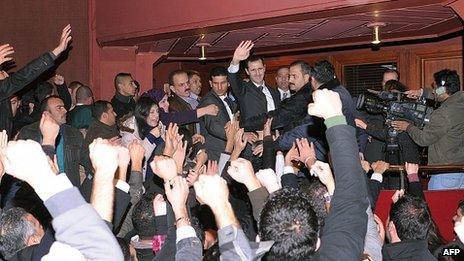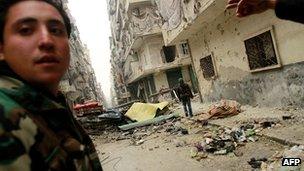Assad rallies the faithful but riles critics
- Published

Bashar al-Assad was mobbed at the end of his address
No sooner did the loud effusive chanting inside the Damascus Opera House subside, than an angry chorus rose from other capitals. A rare presidential speech in the midst of a dangerously deepening crisis only widened the divide.
"Allah, Souria, Bashar ou Bas!" (God, Syria and Bashar are enough) they shouted in a packed hall as President Bashar al-Assad ended a live televised address in which he mocked a revolution that plunged his country into war, and called for dialogue only with those who "have not betrayed Syria".
"The opposition rejects his political solution," came the swift reply from Walid Bunni, spokesman for the Syrian National Coalition, a new umbrella organisation meant to forge a more cohesive opposition.
"He only wants a solution that keeps him at the helm of control."
"Beyond hypocritical," retorted Britain's Foreign Secretary William Hague on twitter. He described the address as "empty promises" that would "fool no-one."
Syria's embattled leader defiantly called for "national mobilisation" to defend the nation from an armed opposition he variously condemned as terrorists, criminals, and foreign puppets.
He also set out his terms for a political solution including a conference to forge a national charter that would be put to a referendum. There was mention of a national reconciliation conference, elections, and an expanded government.
"Look at what he has acknowledged - the need for a political solution," said political analyst Fawaz Gerges who recently visited Damascus.
"But he is also delusional in not acknowledging there is a real opposition."
The president's speech - nearly an hour long - came after a small flurry of diplomatic activity in the midst of a worsening spiral of deadly violence.

Rebels control whole areas of Syria's war-torn cities, like here in Aleppo
As the year ended, UN Arab League envoy Lakhdar Brahimi shuttled between Damascus and Moscow, and there was a trip to the Russian capital by Syria's Deputy Foreign Minister Faisal Mekdad.
Talks also took place between "the three Bs" - Mr Brahimi, Russia's Deputy Foreign Minister Mikhail Bogdonov, and the US Deputy Secretary of State William Burns.
But whatever progress was made, President Assad, under mounting pressure, emphasised there could only be a Syrian vision, made by Syrians.
Mr Brahimi recently warned that Syria faced a stark choice between a descent into "hell or a political process."
He announced some details of a new plan based on last year's Geneva declaration which had spoken of a Syrian-led transition. President Assad said he could only be removed through the constitution.
The opposition has also vehemently rejected any plan which allowed President Assad to stay on, even during a transitional phase.
The speech seemed directed at a nation torn by a deepening civil war that the UN says has cost some 60,000 lives in the past 21 months.
Millions are displaced in desperate conditions inside the country, and hundreds of thousands are refugees living in difficult conditions in neighbouring countries.
"A whole lot of Syrians still stand behind the government," Ammar Waqaf of the UK-based Syrian Social Club told the BBC. "And this is also because we hate the alternative."
Fawaz Gerges predicted that 2013 would be even bloodier than 2012, adding: "This isn't a question of weeks or months."
Recent Western intelligence assessments have, however, predicted that President's Assad time would be up in matter of weeks.
His speech underlined that he was still in Damascus, still determined to fight on, whatever the cost.
The message from the opposition is much the same.